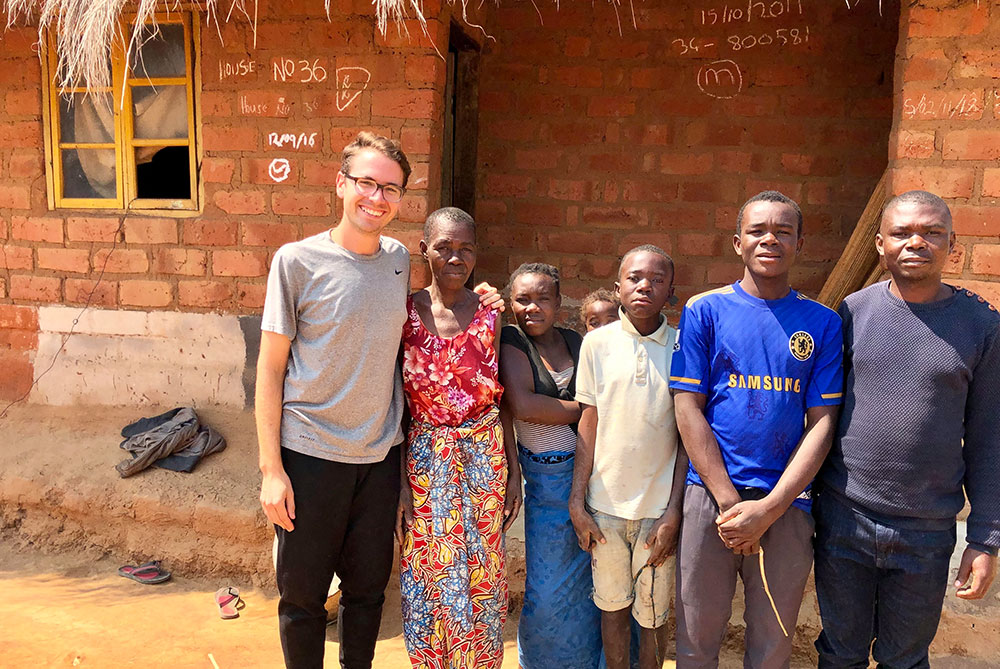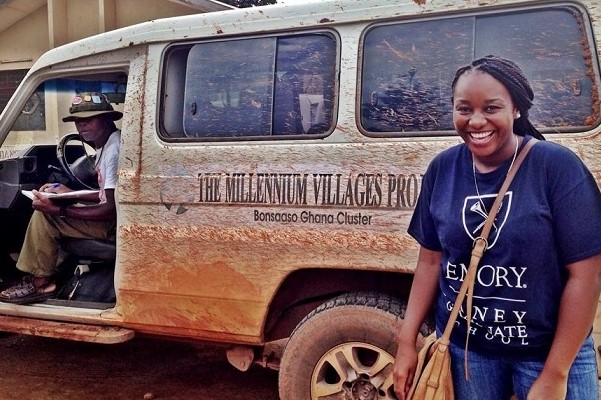Peace Corps Week: Same Same, but Different
A reflection written by Ian Hamilton, MDP 2020
I connected to the wifi as quickly as possible. I hadn’t had reception since I left Ghana earlier that day and was anxious to let those back home know I’d arrived safely in Zambia. As I sipped tea in the kitchen chatting with Judy and Jessi, my travel companion and dear Peace Corps friend, the expected flood of missed messages came in, but one in particular caught my eye. Still listening to Judy and Jessi, I opened my phone and saw the latest text from Courtney, the volunteer who replaced my site. “Hi, Tata passed today…” My mind went numb as I read through the whole message - dumbfounded. How could it be? He was making at least some progress after his stroke last week... I’d been planning this trip for months. Bataata and I were supposed to plant a new row of fruit trees around their compound. I thought I’d get one more chance to see him… Jessi stopped the conversation and saw my crestfallen face. “Ian, what is it?” Returning now to my old village would be a much different visit than what I had imagined.
Ian Hamilton, a Coverdell Fellow for the Master’s in Development Practice program at Emory University, travelled to Zambia to visit his former Peace Corps host family after his 2019 summer field practicum in Ghana. What was meant to be a celebratory reunion turned out to be something he didn’t anticipate whatsoever. ‘Same same, but different’ is his reflection on grief, connection and ultimately the peace that comes after losing a beloved father figure.

Lusaka’s intercity bus station is the tenth circle of hell. I avoided it like the plague during my service, but there is no better way to get up to Luapula Province without catching a bus there first. Surprisingly, the start of today’s journey proved all my previous conceptions wrong. Our taxi driver dropped Jessi and I off, where we were not met by the usual barrage of men trying to take us over to a Livingstone bus line. (I suppose it was too early to harass muzungus, as we are apparent foreigners.) In fact, it was the best experience I’ve ever had at intercity; we shared a strong, milky cup of tea with a few early risers and boarded a near-empty bus - save for three other muzungus and two Zambian families with their little ones - bound northward. The cold wind rattling through the loose windows kept me awake. Although it was still dark and I was running only off two hours of sleep, my mind was wide awake. Tears came, but I didn’t bother wiping them. Who cared? No one could see them. This was the first day without bataata here. There was the fast approaching sunrise he won’t see. The Zambian landscape emerged out of its frosty winter gloom. Our bus cruised along the highway. It wasn’t even mid-morning by the time we rolled through Kabwe. We were making such good time that I debated about staying on the bus all the way to site - a full 15 hours. Today bataata will be buried. I could make it, but I wasn’t ready to face all that yet. I was not going to let my host family down. I must arrive well prepared, with strength and a sound mind to guide me through till the end of my stay, as the stakes for this trip had drastically reshaped over the course of a single night.
Mansa, Luapula’s provincial capital, much like the rest of Zambia, had subtle changes since the last time I’d been two years ago. Most notably, the shiny black three-story Chinese shopping center stood out like a literal thorn against the town’s dusty, tan landscape and low-lying buildings. I spared no expense at the upgraded Shoprite. Nothing was too good for my bamaayo and siblings. I tossed in whatever I figured they would use - cooking oil, mealie meal, salt, sugar, lotion, soap, laundry detergent. They would need extra provisions now more than ever with all the mourners staying at their compound throughout the funeral. If Zambian customs had taught me anything beforehand, it was that I sure as hell wasn’t going to show up empty-handed to such an important event. It was my turn to be the dutiful son and take care of the people who looked after me for two years, and whose support I came to depend upon.
My host brother Chikumbi met me at the side of the road. My goodness - how much he had grown! Here he was a man now. We laughed out loud and unabashedly hugged. He helped me carry my stuffed baggage to the edge of the family’s compound where everyone awaited. The rest that followed came as a blur. My backpack slid off me and I headed straight for my host family’s house. I didn’t even stop to greet either the women gathered around the side of their house, nor the men sitting underneath the mango tree by bataata’s blacksmith shop. Without hesitation, I called, “Bamaayo!” She stepped out the front door. A somber look on her face, she’d been through so much over the last few days. How did she handle it all? Bamaayo was the very definition of strength and she fully embodied it. No words need spoken, with clasped hands, she led me inside.
I lost all track of time. Sitting on the floor, I became engulfed by the wailing around me. Chikumbi cried out how I’d missed bataata, others chimed in to add their voices to the rising swell. I wasn’t much of a fan for funerals while I was a volunteer. My reserved American attitude towards death hindered my comfortability at handling the upfront intensity of the whole Zambian rite. I had no other choice now but to bite the bullet. This was my bataata’s funeral. It was my one shot to mourn him properly with my host family, and I was going to do it right. I was all in. I let uninhibited waves of emotions wash over me. No longer did I try to contain and keep the ache bottled up. I let it all flow freely. I sobbed, strained my voice with every round of wailing, and let my face become a crumpled mess. I allowed my inside to become my outside. The feeling was exhilarating, meditative, and transcendent all at once. With everyone alongside me, I tackled my grief head on and wound up purging it from within. The act was beyond cathartic. My community’s presence reassured me that we would conquer the pain together and forge a new life ahead. Right then, there was no other place I should’ve been in the world but with them. I’m not sure how long I was in their living room for. At last, bamaayo stood and asked me if I knew where the keys to my old house were. I wiped away the remaining tears and exited through the front door.
The next two days meld into one. I caught up with neighbors, played with my sweet dog Tyr, toured my old stomping grounds at Kaombe Primary School where former pupils called out, “Ba Ee-n-ee!” through the classroom windows, and marveled at the new preschool block they just finished putting in. I also managed to pull off a 50 kilometer round trip bike ride into the bush so that I could pay my favorite teacher counterpart Mr. Makasa a visit. I did everything I wanted to, but time is short, and already the sun’s remaining light was fading fast over the Luapula Lagoon. It was the last evening before I had to leave. I shared a final meal of nshima and beans with the remaining mourners - almost all women. Speaking Bemba with them reminded me of this Bantu language’s deep, poetic richness and its value in keeping oral tradition alive. At last, I had to tell bamaayo that I was going the next morning. “Mwakabwela?” she asked. No, I wouldn’t be returning. It would be a long time before I ever came back. This visit gave me the closure I needed; everyone was well and life goes on, but the love remains. Change is inevitable, and I couldn’t bear the thought of Kaombe without bamaayo. That would be too much to handle.
At 5:30 am, I waited on the roadside with my eldest host brother, who I’d actually never met until the funeral. He lives in the Copperbelt and was hitching a ride back down. We were both exhausted from the past couple days. He turned to me, “I’ve heard a lot about you, and I just wanted to say thank you for everything you’ve done for my family.” I was caught off guard, an approaching bus heading directly for Mansa flashed its lights in the distance. My host brother continued, “I wish you all the happiness and may God smile on you for the rest of your days.” The bus came to a halt in front of us and I stepped onboard. I turned around to say goodbye. In a flash, he was gone. I made my way to find a seat in the back. I peered out the window at the predawn hue.
Kaombe, my home, I will always carry you with me. Bataata, wherever you are, I pray you’re well. Mwende umutende, go in peace.
Curriculum
The Emory MDP curriculum combines natural, social, health sciences and management.
FIELD PRACTICUM
The Field Practicum is a core component of the Emory MDP curriculum.

